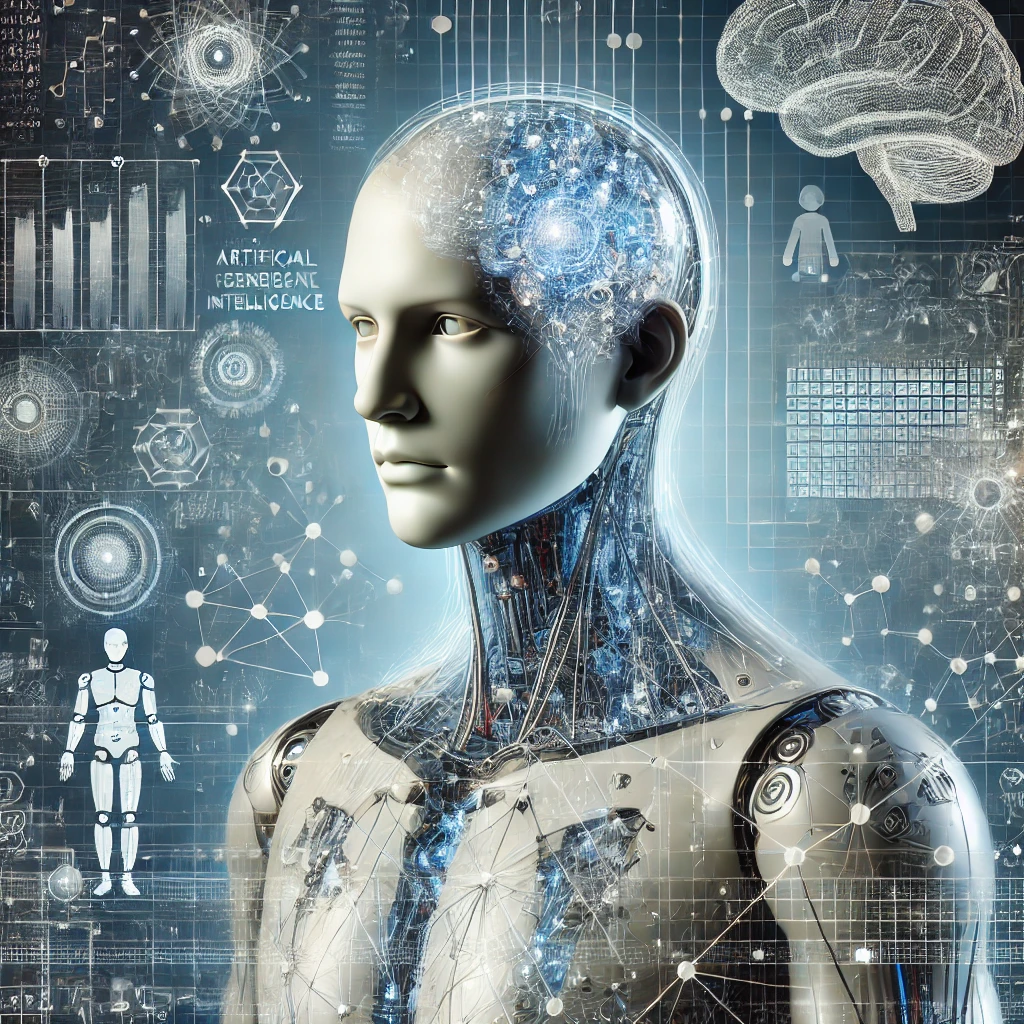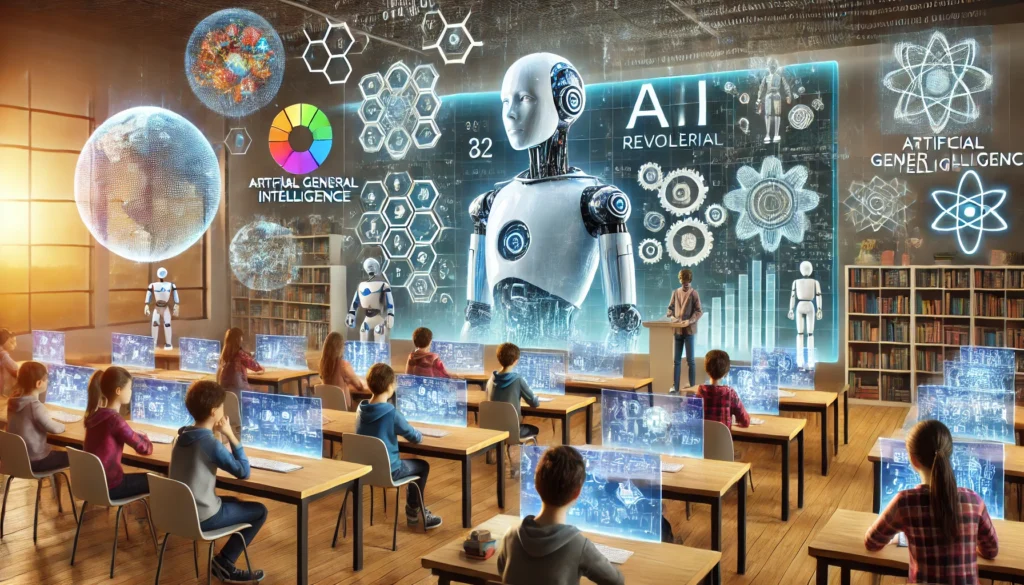Artificial General Intelligence (AGI) refers to highly autonomous systems with the ability to perform any intellectual task a human can, essentially displaying human-level intelligence across various domains. While Artificial Intelligence (AI) has been transforming industries over the past few decades, AGI represents an even greater leap, where machines can understand, learn, and apply knowledge across any subject as humans can. This article delves into what AGI could mean for our future, exploring its transformative potential, benefits, and risks.
Understanding AGI: How It Differs from Current AI
What is AGI?

AGI, also known as “strong AI,” is distinct from the “narrow AI” we use today. Narrow AI refers to systems designed to handle specific tasks (like speech recognition, language translation, or driving), operating within limited parameters. However, AGI aspires to go beyond these restrictions, making machines adaptable, innovative, and capable of critical thinking across numerous domains.
Comparing AGI and Narrow AI
While narrow AI performs targeted tasks based on preprogrammed instructions or data patterns, AGI is built on a framework designed for general-purpose problem-solving. It can recognize contexts, self-improve, and understand complex and nuanced concepts like emotions, ethics, and social interactions. Such capabilities would allow AGI to make decisions and contribute solutions in areas currently considered exclusive to humans.
Potential Impacts of AGI Across Sectors
Transforming the Workplace and Job Market
AGI could fundamentally reshape the workplace by automating complex tasks and decision-making processes across industries. For instance, AGI-powered systems in healthcare could not only diagnose diseases based on medical data but also provide comprehensive patient care recommendations. In sectors like finance, AGI could autonomously evaluate risks, create financial strategies, and predict market trends with unprecedented accuracy.
While this transformation could enhance productivity, it raises concerns about job displacement. However, AGI could also generate new roles focused on overseeing, interpreting, and integrating AGI systems within organizations, potentially creating an evolved job landscape rather than simply replacing human jobs.
Revolutionizing Education

Education is another area where AGI could play a transformative role. AGI-enabled systems could create personalized learning experiences tailored to each student’s pace, strengths, and weaknesses. Imagine virtual teachers who can monitor progress, provide real-time feedback, and adapt lessons to suit each learner’s style. Additionally, AGI could enable education systems to reach remote and underserved areas, democratizing access to knowledge and skills.
However, relying on AGI for education also presents challenges. Overdependence on machines for instruction could lead to diminished human interaction and understanding of context, which are vital to a holistic education.
Healthcare Advancements with AGI
AGI could revolutionize healthcare by not only diagnosing diseases but also providing a 360-degree approach to patient care. AGI systems could analyze vast datasets, detect patterns, and suggest treatments or preventive measures based on global medical research. AGI could also assist in drug discovery, simulate treatments, and even develop new therapies.
But with all its potential, AGI in healthcare requires strict ethical regulations, especially concerning patient data privacy and accountability. If AGI makes a treatment error, for instance, who would be responsible—the machine, its creators, or healthcare professionals?
AGI’s Role in Scientific Discovery and Environmental Solutions
Accelerating Scientific Research

AGI could help accelerate scientific research by analyzing vast quantities of data, generating hypotheses, and designing experiments autonomously. Whether it’s unraveling the mysteries of quantum physics, genetics, or space exploration, AGI could aid in discovering new theories and technologies.
Tackling Climate Change
In addressing global environmental challenges, AGI could play a crucial role in formulating strategies for combating climate change. AGI systems could analyze environmental data from around the world, model climate outcomes, and predict the efficacy of various interventions. For example, AGI could optimize energy consumption, improve recycling processes, and suggest innovative agricultural techniques that reduce carbon footprints.
Ethical and Societal Implications of AGI
Ethical Dilemmas

As AGI becomes more sophisticated, ethical questions arise. Should AGI have rights? Who holds responsibility for AGI’s actions? If AGI makes decisions that negatively affect individuals or groups, how do we assign accountability?
Moreover, ensuring AGI aligns with human values is a significant challenge. Preventing biases and instilling ethical standards in AGI systems is crucial, as AGI’s autonomy means it could operate beyond simple human oversight.
Social Inequality and Access
AGI’s development raises questions about accessibility and power dynamics. If AGI technology is only accessible to wealthy nations or corporations, it could widen the gap between the rich and the poor, leading to a technological divide that exacerbates existing social inequalities. Ensuring equitable access to AGI is crucial to prevent it from becoming a tool of oppression or control.
The Risks and Uncertainties of AGI
Unintended Consequences and Existential Risks

The potential power of AGI brings with it existential risks. Misuse of AGI in warfare, surveillance, or authoritarian control could threaten individual freedom and global stability. Additionally, AGI systems, if not properly regulated, could behave in unpredictable ways, acting on instructions in ways that are harmful or unintended.
Regulatory Frameworks for AGI
Establishing regulatory frameworks is essential for safely integrating AGI into society. Governments and international bodies must work together to create and enforce guidelines that govern AGI’s development and deployment, ensuring transparency, accountability, and ethical standards.
Preparing for a Future with AGI
To prepare for an AGI-powered future, fostering collaboration between governments, tech companies, and research institutions is essential. By proactively addressing challenges, promoting education in AGI ethics and safety, and involving the public in the discourse around AGI, we can better prepare society for the transformative—and potentially disruptive—impacts of AGI.
Conclusion: AGI as a Tool for Human Progress
AGI represents a monumental advancement that could reshape every facet of human life. While its potential is boundless, it also presents unprecedented challenges. AGI has the power to address global issues, improve quality of life, and drive scientific discovery, but realizing its benefits will require careful planning, ethical considerations, and global cooperation. By approaching AGI with foresight, humanity can ensure that this technology serves as a force for good and contributes to a brighter, more equitable future.
Discover more at https://theidlefellows.com/.

